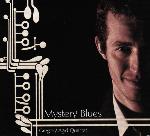Over the past few years, clarinetist Gregory Agid has seemingly remained the New Orleans jazz scene’s best-kept secret. However, with the release of his quartet’s debut album Mystery Blues, the cat is out of the bag. For those not hip to the late Alvin Batiste’s last protégé, the title track of this Delfeayo Marsalis-produced gem gives you a quick glimpse at just how cool Agid and his cats truly are. Were it 1959, Agid’s quartet, which features guitarist Joshua Starkman, bassist Max Moran and drummer Darrian Douglas, may very well have run in stride with Dave Brubeck’s or Gerry Mulligan’s.
[iframe class=”spotify-right” src=”https://embed.spotify.com/?uri=spotify:album:2O8ZhDmWgNId4w9mq1BHW6″ width=”300″ height=”380″ frameborder=”0″ allowtransparency=”true”]Buy on AmazonBuy on iTunes
Aside from its sheen, Mystery Blues’ most surprising aspect comes in the form of is its leader’s modus operandi, the clarinet, arguably the instrument that’s faded the furthest from sight in the genre furthest removed from the public eye.. Captivating throughout, Agid commands his clarinet with a subtle, debonair charm. His clever lines spark “Mystery Blues” cool jazz intrigue, sweep up “Rose Room’s” easy going stroll, and dart up and down “Spy Boy’s” daring bob. Alongside Agid, Starkman’s fretwork provides a swift counterpoint, gliding across “Chelsea Bridge’s” tender sentiments, burning through “Swag’s” shifty strut and nimbly riding “Two Hours’” spirited romp. The rhythm section also comes up aces, moving the melancholy sojourn “Lost Love” with brush strokes and an elegant bass line and filling the closer “Bumps with an inquisitive rush and ardent exuberance. Still, it’s the album’s centerpiece “Summers’ Song (parts one and two)” that most aptly captures the set and the band’s splendor. Here, Agid and Starkman trade solos with matchless fluidity as Moran and Douglas welcome the crisp breeze with a hearty bustle brimming with curiosity. With jazz radio far removed from the mainstream, coming across Mystery Blues or Agid’s band should bring with it a sense of satisfaction akin to discovering a forgotten copy of Time Out or What Is There to Say? buried in a bin of otherwise unremarkable albums procured from a neighbor’s sidewalk sale.





